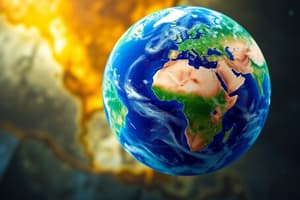Podcast
Questions and Answers
What is the primary characteristic of the biosphere?
What is the primary characteristic of the biosphere?
- It encompasses all living and once-living materials. (correct)
- It includes only living organisms.
- It is exclusively found on land.
- It is limited to freshwater ecosystems.
Which layer of the Earth is known for being relatively rigid and breaking due to stress?
Which layer of the Earth is known for being relatively rigid and breaking due to stress?
- Outer Core
- Lithosphere (correct)
- Mesosphere
- Asthenosphere
What is the primary process responsible for the formation of Earth’s layered structure?
What is the primary process responsible for the formation of Earth’s layered structure?
- Planetary Absorption
- Layering by Chemical Properties
- Convection Layering
- Planetary Differentiation (correct)
At what depth does the asthenosphere lie beneath the lithosphere?
At what depth does the asthenosphere lie beneath the lithosphere?
Which layer of the Earth is entirely liquid and is responsible for Earth's magnetic field?
Which layer of the Earth is entirely liquid and is responsible for Earth's magnetic field?
What defines a closed system in geology?
What defines a closed system in geology?
Which layer of the atmosphere is known for temperature decrease with height until reaching a temperature close to -90°C?
Which layer of the atmosphere is known for temperature decrease with height until reaching a temperature close to -90°C?
What is the primary composition of Earth's atmosphere?
What is the primary composition of Earth's atmosphere?
Which layer of the atmosphere serves as the site of the ozone layer?
Which layer of the atmosphere serves as the site of the ozone layer?
Which ocean is recognized as the largest and deepest ocean on Earth?
Which ocean is recognized as the largest and deepest ocean on Earth?
What percentage of Earth's water is represented by the ocean?
What percentage of Earth's water is represented by the ocean?
What is unique about the Arctic Ocean compared to other oceans?
What is unique about the Arctic Ocean compared to other oceans?
Which layer of the atmosphere contains the International Space Station (ISS)?
Which layer of the atmosphere contains the International Space Station (ISS)?
Flashcards
Geology
Geology
The scientific study of Earth.
Physical Geology
Physical Geology
Focuses on Earth's physical features, materials, and changes.
Closed System
Closed System
Allows energy exchange but not matter with surroundings.
Open System
Open System
Signup and view all the flashcards
Troposphere
Troposphere
Signup and view all the flashcards
Stratosphere
Stratosphere
Signup and view all the flashcards
Hydrosphere
Hydrosphere
Signup and view all the flashcards
Geosphere
Geosphere
Signup and view all the flashcards
Planetary Differentiation
Planetary Differentiation
Signup and view all the flashcards
Lithosphere
Lithosphere
Signup and view all the flashcards
Asthenosphere
Asthenosphere
Signup and view all the flashcards
Crust Thickness
Crust Thickness
Signup and view all the flashcards
Earth's Layering
Earth's Layering
Signup and view all the flashcards
Study Notes
Geology Overview
- Definition: Geology is the scientific study of Earth.
- Physical Geology focuses on Earth's materials, surface and internal changes, and the driving forces behind these changes.
Resource Consumption
- Average American consumption of materials:
- Nonmetals: ~8.666 kg/year
- Metals: ~147 kg/year
- Energy: 958 gallons of petroleum, 1908 kg of coal, 2775 m³ of natural gas, 0.06 kg of Uranium.
Earth as a System
- Closed Systems: Permit energy exchange but not matter with surroundings.
- Open Systems: Allow both energy and matter to flow in and out.
Earth Systems Components
Atmosphere
- Composed mainly of nitrogen; supports life.
- Divided into layers:
- Troposphere: Lowest layer where weather occurs; warms from the base.
- Stratosphere: Contains ozone layer; temperature remains constant up to 20 km, then gradually increases until 50 km.
- Mesosphere: Temperature decreases until mesopause, reaching about -90°C above 80 km.
- Thermosphere: Temperature increases due to solar radiation absorption; location of the International Space Station (330-435 km altitude).
Hydrosphere
- Refers to all water on or near Earth’s surface.
- Oceans cover 71% of Earth's surface; 97.5% is saltwater, 2.5% is freshwater (from glaciers, groundwater, rivers, lakes).
Ocean Geography
- Northern Hemisphere: Known as the land hemisphere (61% land, 39% water).
- Southern Hemisphere: Known as the water hemisphere (81% water, 19% land).
- Pacific Ocean: Largest and deepest ocean; spans from Arctic to Antarctic Oceans.
- Indian Ocean: Third largest, primarily in the Southern Hemisphere, bordered by Asia, Africa, Australia, and Antarctica.
- Atlantic Ocean: Second largest, bordered by Europe, Africa, and the Americas.
- Arctic Ocean: Smallest and shallowest, only 7% the size of the Pacific Ocean.
- Antarctic Ocean: Also known as the Southern Ocean; defined by Antarctic Convergence, located around 50° south latitude.
Biosphere
- Encompasses all living and once-living materials.
- Earth is the only known location to support life; includes ecosystems from soil to rainforests and oceans.
Geosphere
- Solid, rocky component of Earth, differentiated into Crust, Mantle, and Core.
- Planetary Differentiation: Process leading to Earth's layered structure based on material density.
- Lithosphere: Uppermost mantle and crust; rigid, prone to stress leading to earthquakes.
- Asthenosphere: Below lithosphere, where convection occurs, extending to 660 km depth.
- Mesosphere: Lower mantle, from 660 km to 2900 km depth; strengthens with depth.
- Outer Core: Liquid layer from 2900 km to 5150 km; generates Earth's magnetic field via convection.
- Inner Core: Solid core from 5150 km to Earth's center, composed primarily of solid iron due to immense pressure.
Layering of the Earth
- Layering based on Physical Properties: Describes structure based on density.
- Layering by Chemical Properties: Distinguishes layers as solid or liquid, affected by strength and state.
- Crust Thickness: Ranges from 5 km to 80 km, the thinnest layer of the Earth.
Studying That Suits You
Use AI to generate personalized quizzes and flashcards to suit your learning preferences.




